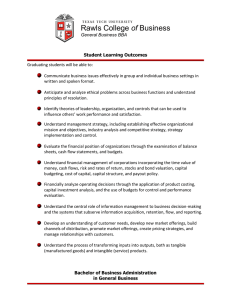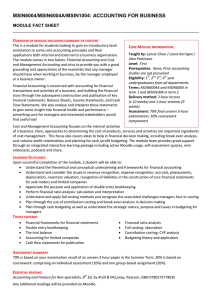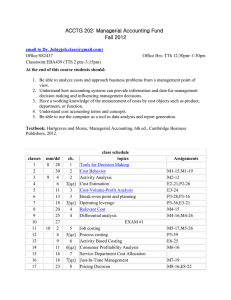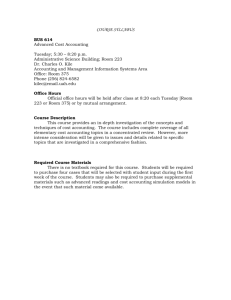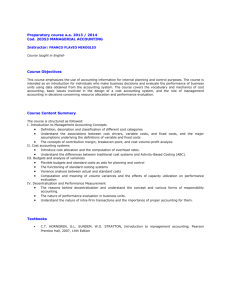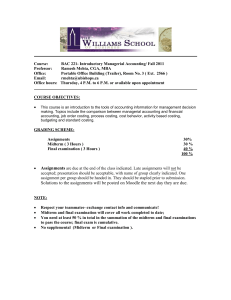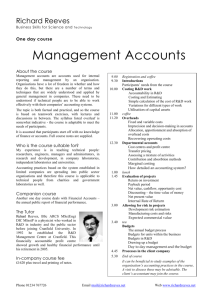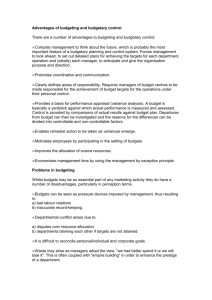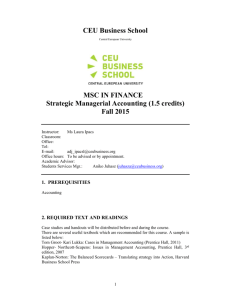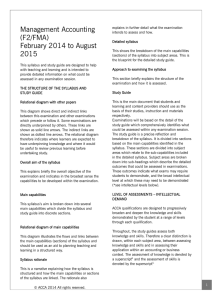Managerial Accounting_ACC 301_8
advertisement
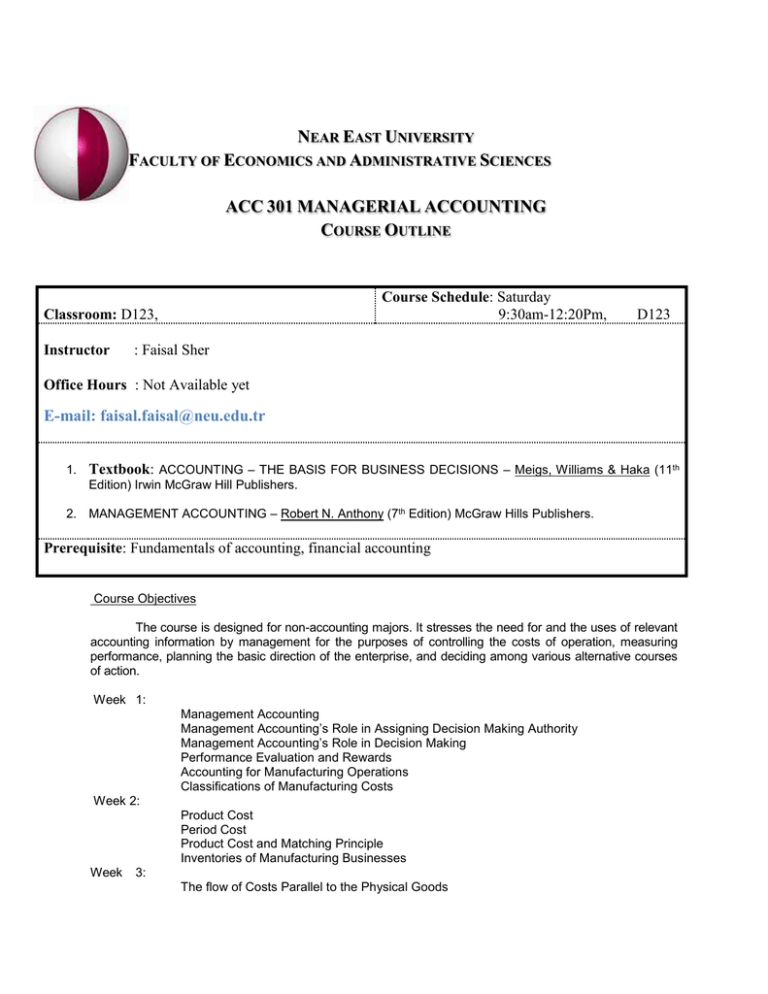
NEAR EAST UNIVERSITY FACULTY OF ECONOMICS AND ADMINISTRATIVE SCIENCES ACC 301 MANAGERIAL ACCOUNTING COURSE OUTLINE Course Schedule: Saturday 9:30am-12:20Pm, Classroom: D123, Instructor D123 : Faisal Sher Office Hours : Not Available yet E-mail: faisal.faisal@neu.edu.tr 1. Textbook: ACCOUNTING – THE BASIS FOR BUSINESS DECISIONS – Meigs, Williams & Haka (11th Edition) Irwin McGraw Hill Publishers. 2. MANAGEMENT ACCOUNTING – Robert N. Anthony (7th Edition) McGraw Hills Publishers. Prerequisite: Fundamentals of accounting, financial accounting Course Objectives The course is designed for non-accounting majors. It stresses the need for and the uses of relevant accounting information by management for the purposes of controlling the costs of operation, measuring performance, planning the basic direction of the enterprise, and deciding among various alternative courses of action. Week 1: Management Accounting Management Accounting’s Role in Assigning Decision Making Authority Management Accounting’s Role in Decision Making Performance Evaluation and Rewards Accounting for Manufacturing Operations Classifications of Manufacturing Costs Week 2: Product Cost Period Cost Product Cost and Matching Principle Inventories of Manufacturing Businesses Week 3: The flow of Costs Parallel to the Physical Goods Accounting for Manufacturing Costs Direct Material Direct labor Week 4: Manufacturing Overheads Direct and Indirect Manufacturing Costs Overhead Application Rates Work in Process, Finished Goods & Cost of Goods Sold Need for Unit Cost Data Financial Statement of a Manufacturing Concern Week 5: Global Business & Accounting Globalization Environmental Forces Shaping Globalization Foreign Currencies & Exchange Rates Week 6: Accounting for Transactions with Foreign Companies Currency Fluctuations Global Sourcing Case Study (A Practical Project) Week 7: Costing & Value Chain The Value Chain Activity Based Management The Target Costing Process Components of Target Costing Week 8: Characteristics of Target Costing Just in Time Inventory System TQM and the Value Chain Components of Cost of Quality ------------------------MIDTERM EXAMS----------------------------------------Week 9: Measuring the Cost of Quality Productivity and Quality Incremental Analysis The Challenge of Changing Markets The Concept of Relevant Cost Information Week 10: Relevant Information in Business Markets Special Order Decisions Production Constraints Decisions Make or Buy Decisions Joint Product Decisions Week 11: Responsibility Accounting & Performance Evaluation Responsibility Centers Responsibility Accounting Systems Assigning Revenue and Costs to Business Centers Contribution Margin Week 12: Fixed & Variable Costs Traceable & Common Fixed Cost Responsibility margin Responsibility Center’s Reporting in Financial Statement Week 13: Operational Budgeting The Basis for Planning and Control Benefits of Budgeting Establishing Budgeting Amounts Week 14: The Budget Period The Master Budget Preparing Master Budgets Week 15: Operational Budgets Estimates Financial Budgets Estimates Week 16: Review Presentations Examination Course Assessment/Evaluation Grades in this course will be assigned according to the following criteria: Mid-term Examination Final Examination Quiz/Assignments 40% 60% 10% Total: Letter grades will be based on the following: AA BA BB CB CC DC DD FD FF 90-100% 85-89% 80-84% 75-79% 70-74% 65-69% 60-64% 50-59% 0-49% 110% Course Policies and Obligations of Students Those students that attend class on a regular basis generally have greater success than those that do not. Therefore regular attendance is encouraged (even though students will not be graded on attendance) and students should be prepared to take part in class discussions and assignments (which students will be graded on). The students should have accounting books already mentioned in the outline heading which is important in understating the basic ideas of the questions and the related concepts. All assignments assigned should be submitted on time and in class (late submissions and submissions out of class will not be accepted). Students are required to successfully pass exams and quizzes. In class students are required to behave in a manner that aids rather than distracts from learning.
